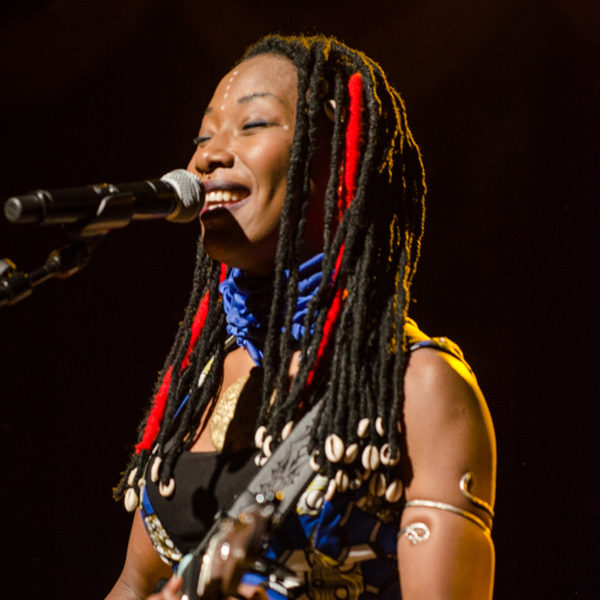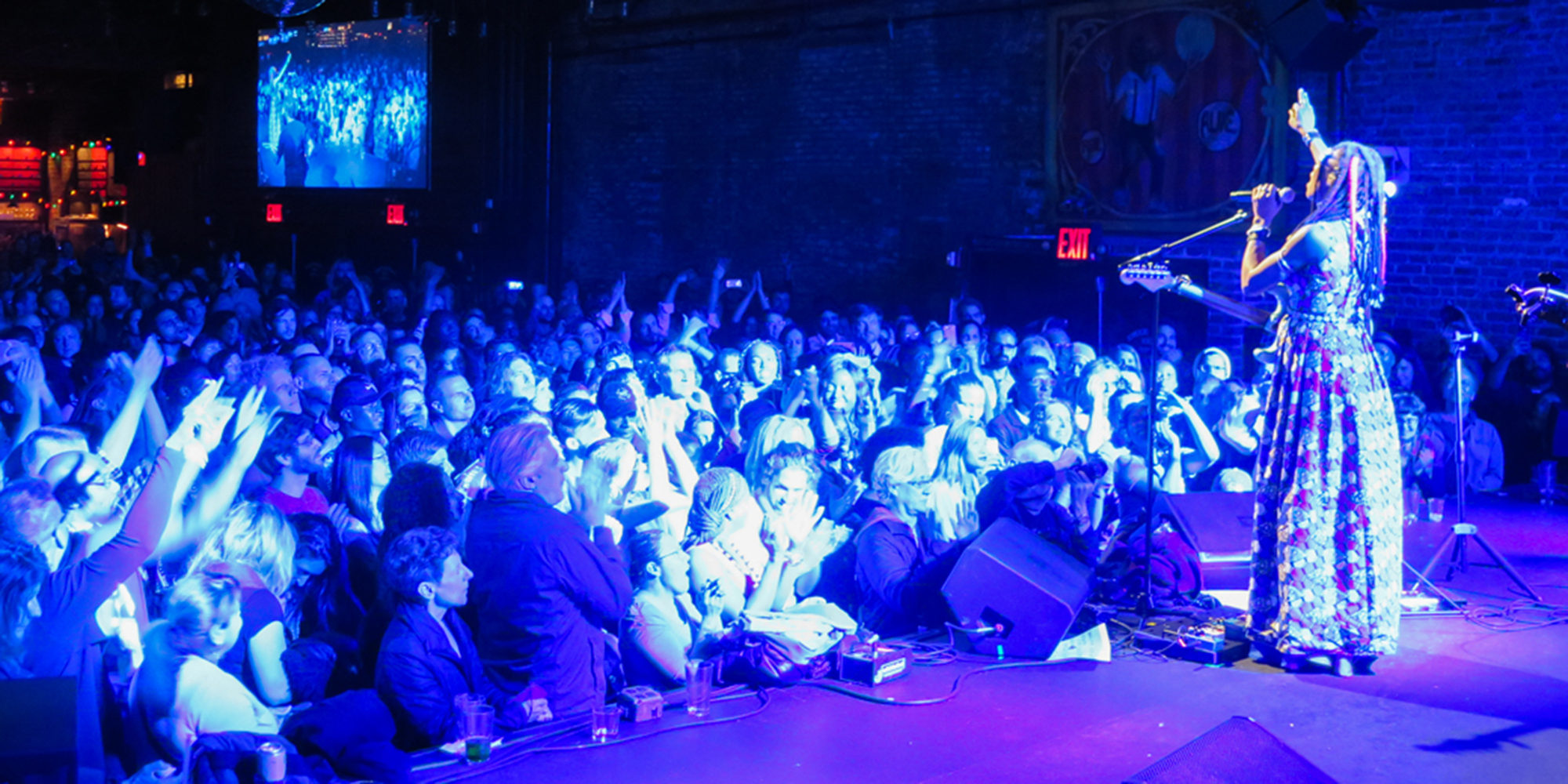Fatoumata Diawara is one the most in-demand Malian singers on the international scene. Since releasing her 2012 debut Fatou (World Circuit), she has been venturing into realms of jazz and pop with the likes of Herbie Hancock, Snarky Puppy and Bobby Womack. This year, she’s out with her second album, Fenfo (Shanachie). She’s been touring with the album, and on a recent stop in New York to play the Brooklyn Bowl, as part of the World Music Institute’s Mali Music Festival, she spoke with Afropop’s Banning Eyre.
Banning Eyre: Fatoumata, it sounds like we can speak in English now. The last time, we spoke French.
Fatoumata Diawara: I've been studying a little bit.
That’s excellent. Let's talk about this album, your second album. You've taken some time with it.
Yes. You know, an album for me, it's not to rush. I'm not making an album just to make money. It's a different process for me. It's like exposing myself, telling about my story, my opinion as a woman, as a child from Africa. It's about my freedom. And it's like a debate, or a conversation between me and my audience. And for this, you can't run. You should take your time. It's like you're on a mission. I do everything. I write my own things and when I'm selecting the songs and melodies, it's all about making sure the album will last. It's forever. It should be something great. It should be like the best friend of your audience. When they're listening to it, I just want them to feel good. And for that, I should be feeling no pressure, no label pressure, not doing things because people told me to do it. I do my music because I'm ready to share something with my audience.
And also, in the middle, I've been doing a lot of great projects. Really, very special things. With Herbie Hancock, the “Imagine” song, Damon Albarn “Rocket Juice and the Moon.” Also Bobby Womack, one song on the last album. [“Nothing Can Save Ya.”] Roberto Fonseca. Also “Mali Ko”...
Yes, “Mali Ko” that was the song you made with all those Malian singers in response to the crisis of 2012.
Yes. In Paris.
So while you're doing all these other things, are you constantly writing songs, or is that something that happens when it's time to make it up? What is your writing process like?
When it's time to write, I write. I don't know why. There is no reason. Maybe I saw something while I'm traveling, or sometimes when I listen to some subject on radio or TV and I'm sad. You know the best way for me to cry is to write music. It's kind of blues to me. It replies to my crying. Because I represent this generation in Africans who don't want to complain. We want to stop complaining. We don't want people to see us as pitiful persons. We are starting to be responsible. This generation wants to fight to be somebody to change the image of Africa. That's why music is important in Africa. It lets us express ourselves in a positive way.
It's interesting that you talk about it in terms of your generation. We've been on the air for 30 years, and we've been going back and listening to some of the old programs. You really sense how much things have changed in the culture of African musicians. You say you don’t want to complain anymore. It reminds me a little bit of what Jupiter from Jupiter and Okwess said to me recently. He spoke of the generation before him as the "sacrificed" generation.
Exactly.
Because they were beholden to leaders who were keeping them down.
Exactly.
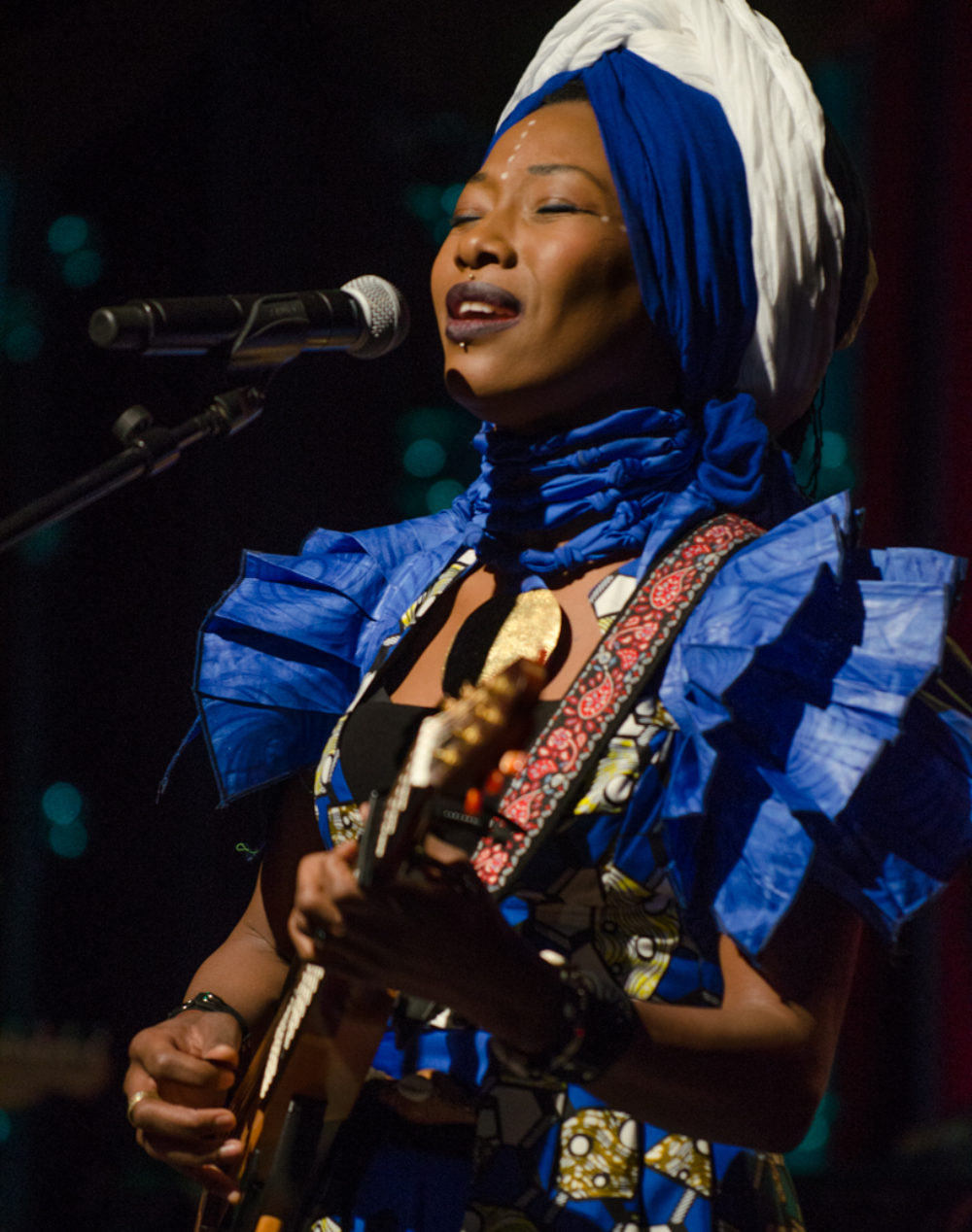
It seems like now there's a lot more license for artists to speak out boldly.
Yes, but you have to put things in a positive way. It's true. We want to change the image of Africa, because we've been realizing that only we ourselves can change Africa. Nobody can do it for us. People try, because they love us, but only we can change things. We understand that we should stand up and try to write our own story.
So when you're writing the songs for this album, part of it is personal, as you were saying. But is there also a sense that a song might change somebody's mind about something.
For sure, but when I write the songs, in the first place, the melody is there to touch anybody in this world. It doesn't matter what color or what country you come from. You could be from Asia, from India, from Africa, from America. This is my melody, my type of writing. The meanings are mostly for the new African generation, but it could be for other generations too, for all the world to hurt, because when I'm singing about peace, it’s for all the world. It's about the planet.
Yeah, the lyrics will be talking about how to share with our audience, this new generation, because I don't need to be close to them physically. Today we have a chance to have all the social media. Facebook, Twitter, Instagram, all those, so we can be in touch very easily. So now it's like for the first time we can communicate with each other on subjects like arranged marriage, female emancipation, children's education, peace, love, African emancipation, and how to be unified. We need unity in Africa. Stop complaining. Stand up and make things happen. Make things happen by yourself. Don't wait for people to save you. You should be part of the fighting.
Yes, social media has really changed the game, hasn't it? Of course, it helps every side too.
I know. I know, but for now, on the cultural side, it's a really good connection for Africa. Because my audience is not only Malian people. They come from all over the world, an this is because of social media. My lyrics are talking about women, and that concerns all women. It doesn't matter where you are from. When I say women, everyone will feel like she's part of the subject. And this is great. It's a good connection for the world.
So let's talk about some of the songs, like the opening track, “Nterini.”
“Nterini” is about migration, how we leave our people. Because in Africa, for four or five years, we've been seeing some of the young generation leaving. When you don't know Africa, you think this has been a problem since forever. No. It's a very new problem. Many are traveling in the desert and the sea, the Mediterranean Sea. This image was seen a lot in Europe in the last five years, every day. And I was starting to feel very bad because, O.K., I'm fighting as Fatoumata to tell about this new Africa is starting to be themselves, and when you see the images of all this young generation on the sea, you feel like Africa is finished. It's at the end. But it's not the truth. We’ve got a lot of big hope in these countries. Many beautiful things happening there.
So “Nterini” is for people who don't know Africa. It's up to me, through my music to tell people where those young people come from, before they become immigrants. They were somebody before. They took coffee in the morning. They have a mother, a father, brother, sister. Love stories. They are totally normal like you and me. And so their story doesn't start in the sea or the desert. They weren't born as immigrants. They were humans first. So this is “Nterini.”

Then we've got another song “Takamba.” I love takamba because it's one of the very traditional musics from the north of Mali. It's a sonority that Ali Farka had been working on a lot. It's a kind of heritage for African people.
What are you saying in that song?
I chose this melody from the north to talk about peace, between the north and the south in Mali. We still got a lot of tensions. So as artists, we should keep fighting for peace, to bring peace back. And this was the first message when I decided to do this. We had a problem in the north of Mali. I had heard many women complaining that people came to rape them, to beat them. The song is one of the first songs I wrote for this album, back in 2014. After the French came into Mali.
I said, O.K., “I should talk to women.” So it's about a woman turning to her husband and saying, "I am supposed to be your friend. I'm supposed to be your girlfriend, your wife. But why are you beating me? Why are you raping me? Why are you shouting at me in front of my children? Why are you humiliating me? I am your sister. I'm supposed to be good for you. We need peace. Don't shout at me in front of children. Don't beat me in front of my children." So it's kind of a song for a Malian woman speaking out.
That's very powerful. I know things are still very tense in the north, and whenever there's tension in the political world, people feel it at home.
And the women are always the first ones to suffer. I don't know why. This is not fair.
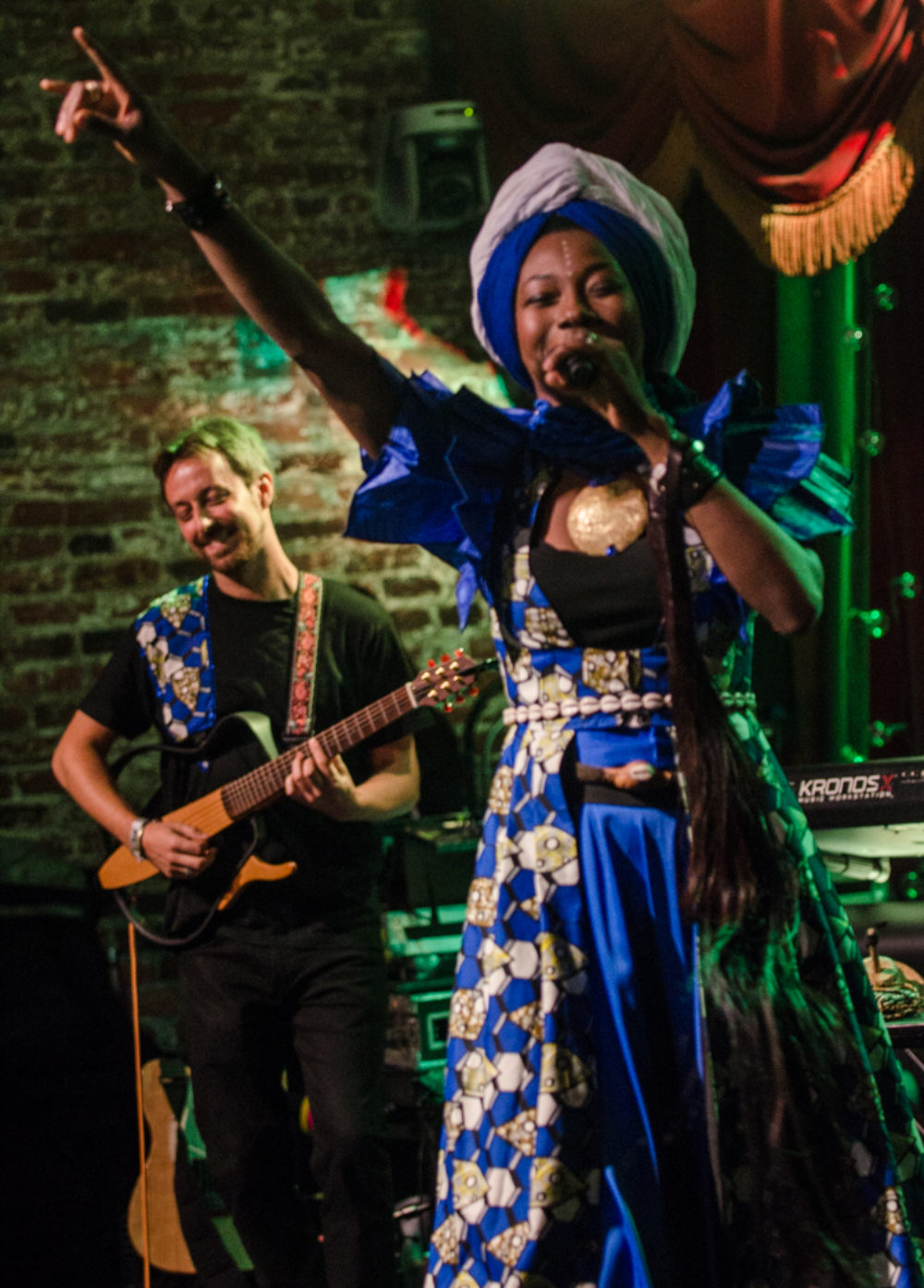
So you are continuing in a tradition of female singers who speak up for the rights of women. All the way back to Fanta Damba with “Diaraby,” and all of Oumou Sangare’s great songs about women. One of my favorite memories of Oumou was seeing her perform in Bamako, and she was talking to the men in the audience and quoting the Koran to them about how a man needs to treat his wife if he has more than one. And she asked them, “What would you think if we wanted to have four husbands?” And they were shouting back at her. She was having fun with it, but it's serious.
It's serious. We should keep fighting. There are only a few female artists doing this. It's a big responsibility. Because people can hate you. You can really have a problem with all those things.
Do you get push-back like that?
For now, no, because I take time to write things. I like to be direct, but very honest. That type of writing. People can feel that it's a done in a very respectful way. And it’s for the best of the country and the continent.
So it's the way you say it.
Yes, and also the selection of melodies. Because melody will lessen the hardness of the language. It can be sweet. Because I'm a woman, I'm in the middle, I can do that. I can be strong and at the same time sweet and giving a lot of love. It's like a kind of education. When you see things, and you put yourself in the position of a mother. Because we've got this instinct of mom inside of us. That’s part of this relationship I have with my generation, I talk to them like a mom, even the old people, I will talk to them like a mom, like a baby starting to speak up, but I will be straight and responsible, a very clear message, and say, "Let your daughter be married to someone even if he's not rich. If they are in love, let love survive. Let love fly like a bird."
I can even talk to all people. And for now, people respect me for it. I’m really happy for that, because in the beginning I started right away singing protest songs. This is what I know how to do. I can't sing love. I can't sing lightly. Because my background, is so heavy, I can't say I come from the flower. No. I have been fighting to survive, to be where I am today. So when I started to sing, I felt I should share my story, but love needs to be the main aim of anything you do.
Your hardness, people will feel it. Life was very hard for me in the beginning. But it was good in the end, because today I feel like I'm young and I’m old at the same time. I can communicate with old people and they won't feel upset or anything. I'm in the middle, between the old and the young. It's kind of strange.

The first time we spoke was in January 2013, just after the French military came into Mali to end the occupation of the north. We talked about politics, but we didn't really get into your story. You say you had a hard past. Tell our listeners a little about your early life, and how you came to have the poise and confidence that you have now.
It’s like very wild. You could make 100 books with my story. Every single part, you open the door, it’s like POOF! I could tell you every day about what was going on. But to be very simple, I’m a person who didn’t grow up with… I can say maybe it was love. I don’t know. I’ve been adopted with my aunt. I grew up with my aunt, who was beating me for 10 or 11 years, beating me until I ran away. I was supposed to get married to my cousin, and I said no. I’ve been fighting for every single time of my life.
I was like a newborn when I started to grow dreadlocks, and stopped all these female things. I said, “Now you should believe again.” This started when I was 26 years old. When I was starting to make my own music and everything. I can say I was born again.
You say you lived with your aunt.
Yes. A sister of my father, you know. Because it’s like since I was born, people didn’t understand me. I have no good memories of being a child. Quickly I knew what I wanted. I didn’t like the way people were treating me. They were always judging me. They were always thinking that I’m this, and I wasn’t that complicated. I was more simple than most people imagined. But when you don’t feel your place in the world, you can go crazy with that when you’re a child. You’re not living with your mom. You don’t have love from your parents, and then you go on a different place, and everyone’s looking at you and judging you, so you can’t learn how to be yourself.
One of the first things that I’ve been keeping until now is to be myself. I don’t want to be like somebody else. Just tell me about your opinion. Nothing can influence me. And sometimes people are afraid of that. I was like this very, very early,
So how did you break away from that situation? By this time, you were in the city, in Bamako.
In the city. It began when I started to be an actress, when I was 14 years old. I left my parents after 12 years. I went to Bamako to my aunt’s, and she was an actress. One day she took me to a film shooting, and the director saw me. He saw me and said, “I want this girl in my movie.” And my aunt said yes. So I started to do this, two lines on this movie. Another movie came, it’s like wow, I started to be an actress. And she didn’t have control like this. I had become her dream. It was supposed to be her to be famous, and when I started to do it, something started to be very complicated in my life.
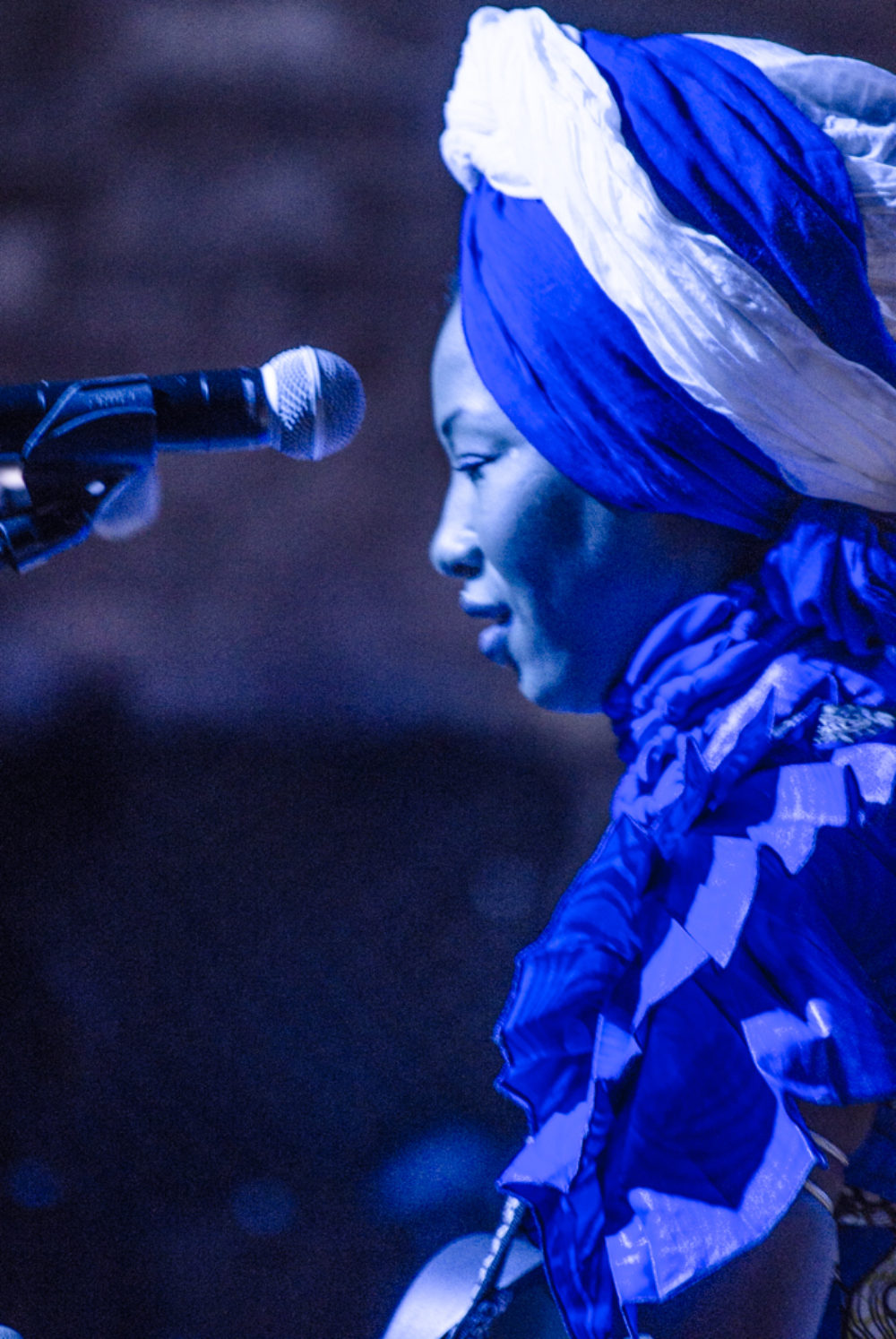
So this is in the '90s, after the end of Moussa Traore’s military regime.
Yes. After all, I’m only 36.
And this aunt is the same one who beat you. But she’s also the one who brought you to acting.
You see what I mean? I can’t say she was jealous, because she’s my aunt. But she was unhappy. It was a different part of my life. And very many things happened then. I never share it all with people, but the part I say is, O.K., this is a small part of my life. So that’s why this album is called Fenfo. Becase fenfo means, “I have a lot to say.” I didn’t start yet. I have all my life to tell about. I just have to open a small door, and I can make a song of it. To save other children, to save other women, to save other people in a bad situation, when you can’t fly, when you are still a slave. And I have this image of a bird that has its wings folded. I would like to see every winged bird fly. If it’s possible.
I want to ask you about one more song in the record that I really love, “Negue Negue.”
Yes, this Afrobeat song. This song is one of the light subjects I have. It’s sweetness, inviting my audience to join us, to have fun, to enjoy life in a simple way. Just let you go, sister. Let you go, brother. Come to me. We gonna dance. We’re going to move together. And it was in memory of Fela Kuti, this strong music, Afrobeat music. It’s like a heritage. We should hold it high. This is my participation in that.
You’ve got a lot of different styles here, Afrobeat, takamba, blues. Did you have an overall concept, or were you just writing songs?
I just write as it comes. Then afterwards, for an album, I’m going to have like 30 songs. Then with my manager, we select songs. It was difficult to select. I had a lot of songs. I spend my time writing songs. I go everywhere with my guitar and I love singing. I love creating songs and writing about subjects. I’m a storyteller. I like to open the door. And it was difficult to decide, but I’m lucky I have a crew. My manager helps a lot.

Let me end with this. I know when you sang that song about Mali’s crisis, it was a powerful political moment. And artists were coming together to make a statement at a hard time. But now that the crisis has passed, do you ever get frustrated at the limits of what an artist, a singer can do? What can artists really do to face these huge problems of faith, politics, corruption? These things have been going on for so long. Do you ever get discouraged as a singer facing such big problems?
I like this question. Yes. It’s not easy. It’s not easy to take on some subjects like politics and war and rape and all these things. Because you should keep being close to the music. The aim should be music. Music must be the first thing, then the lyrics after. You can make it happen. Because some people don’t want to know about hard subjects and everything. It’s like when I write music, I want the children to listen to me too, and for this, I need to be very sweet to my melody. I don’t want them to pay attention to what I’m saying about women and violence and women’s rights. So it’s very delicate. I take time to write a song because of this, because I want people to feel first how much I love them through my melodies. The first time, I want you to forget the lyrics.
Why? Because with the politicians already in the world, they are making life on this planet very hard. It’s like the main thing is to be mean, to be intelligent. What is the education for the future generation? It’s like to be rich. To be someone in this world, you must be mean. For me, this is the only message that they are sharing today with the new children coming.
That means my job as an artist is to remind the children that love does exist. We should keep telling them about difficult subjects, but with the most sweet melody, and bluesy guitar. We should tell them that love is still there. It’s still next to us. Politicians, they are only one way, but we can’t be one way. That’s why we are in between. We should tell strong stories, but the main thing is to have good melodies, blues sound, and Afrobeat. You see what I mean? It’s quite delicate.
That’s wonderful. When you put it that way, it seems like children might be your most important audience, because you can still influence them. You can help them. We have to stop now, but it’s been such a pleasure to speak with you.
Thank you.



Related Audio Programs
